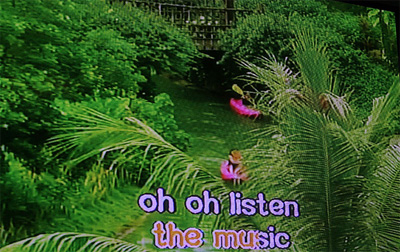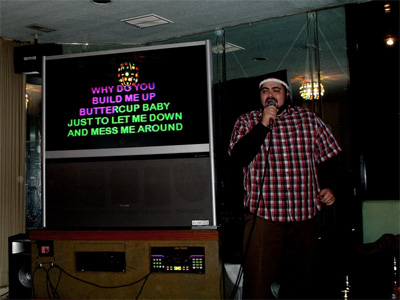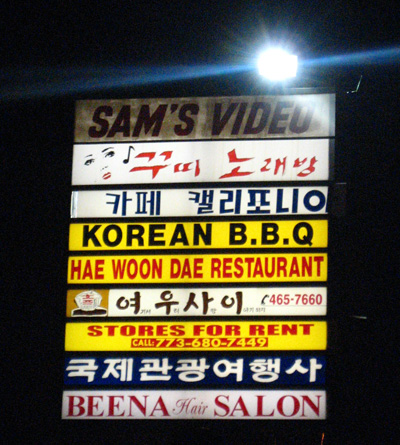It was quiet night in a small town in northeastern Kansas. The year was 1994 and I was 12 years old. My dad special ordered this thing called a karaoke machine from some Korean warehouse in Chicago. Once my dad hooked the thing up to our big screen television there was no stopping him, or my mom. They stayed up all night singing oldies and newer Korean "trot" songs by all their favorite singers. On Sundays, they would invite their friends over after church to drink beer, chew on dried squid snacks, and spit into a communal microphone. There was even a selection of gospel songs that some of the women liked to start out with, but after a few beers, it all went out the window.
While doing my homework in my bedroom on the third floor, I could hear the echoes of their singing and laughing all the way from the basement. I didn't really get the obsession until I made a new friend in middle school who had recently immigrated from Seoul, South Korea. She introduced me to Korean pop songs and squealed with delight when I told her that we had a karaoke machine at home. She became my best friend; so did her brother. My parents encouraged us to sing for hours on the machine in hopes that I would learn to read Korean characters better. And believe me I did. Out of envy for the Korean language and singing skills of my FOB ("fresh off the boat" for those who are unfamiliar) friends, I carried my Walkman everywhere with me and listen to the same pop songs over and over again until I had the melody down pat.
Shamelessly, I counted down the hours and minutes until school was out, eagerly awaiting my newfound passion in life — karaoke. Once we made it to the driveway, I'd dart out of my dad's Ford Ranger and nearly stumble down the stairs to practice the same songs until I had them perfectly memorized. In the seventh grade, I decided that I was going to become a gasu or singer. But unlike the ugly duckling in children's folk tales, I never blossomed into a swan; and puberty left me with many extra pounds and pimples on my forehead in my freshman year of high school. Even though my dream of becoming a famous singer was shot, my love for the karaoke machine was never lost.

photo by Sue Peacock
Although introduced by the Japanese, Koreans have adopted this form of entertainment which can be found all over the South Korean peninsula. Before the machine was developed in the 1970s, Koreans would gather with friends to share a meal and a few bottles of soju. At any moment, a man or woman would get up to sing a song expressing their happiness or heartache and the others around the table would use their metal chopsticks and empty bottles as instruments. In the same fashion, when my parents had a long day at work, they'd call me down to the basement and tell me to sing them some songs. Thanks to the karaoke machine, I learned their favorite songs and it made them so happy when I sang them. Old Korean folk tunes with lyrics like, "I love you so much I hope your legs break so that you'll never leave me." (I promise, in Korean, its sounds so much prettier.)
There's been a long standing joke amongst Korean immigrants and their 2nd generation offspring that wherever communities of Koreans settle the first three things they establish are a church, a restaurant and a dry cleaner. Fast-forward to 2007 and I'd add norae-bang, or song-room, to that list. More and more, norae-bangs are a common-place in any Korea-town in LA, NYC, Chicago, Seattle, Atlanta, Dallas and even Jacksonville, Florida!
Each room, depending on size, contains large flat screen televisions, a karaoke machine, two microphones, a remote for your machine, a song book thicker than your world history textbook from high school, a questionable couch with floral patterned material (or sometimes pleather in out-of-date colors like teal or magenta), and if you're really lucky, a few tambourines and a disco light for the really festive. Guests can expect to pay anywhere from $20 to $50 an hour for a room. The owners will bring you snacks and drinks to lure you into staying longer... and each time, it works!

photo by Andrea Small
In Korea, norae-bangs are a common post-dinner destination for office sponsored parties where the boss can command anyone to sing and dance on demand. The bigger the fool, the more devoted you are to your boss and company. This form of bonding has floated across the pond, and the best thing is that Koreans are not the only ones to embrace it. Many fun-loving Americans, whether white, black, Hispanic, tone-deaf or rhythmically challenged, have taken part in this activity — which is enhanced by many shots of soju (Korea's answer to vodka).
Recently, I celebrated my 25th birthday Korean-style. Korean BBQ followed by Korean karaoke where the smoky smell on our clothes left behind by the grill was more than welcome. Because you're in your own private room, away from the gaze of strangers in a seedy bar, you feel free to sing sappy love songs with feeling in company of friends only. Talk about true friendship — there's no shame to singing Frank Sinatra's "My Way" and topping things off with Madonna's "Like a Prayer" with tambourine in hand.
Many of my friends never had the pleasure of experiencing norae-bang before but once we were in that room, they acted like they were born with mics in their hands. My friend Erin was even surprised by her boyfriend who shared a few tunes with the large birthday group. Now, whenever we go out for dinner, they ask, "Will there be karaoke after?" And I say yes friends, there will always be karaoke.

photo by Bora Un
In Chicago, I recommend these places for English-friendly service:
Lincoln Karaoke
5526 N. Lincoln Ave. 773-728-6500
This is where I had my birthday party and the owners were more than accommodating. We had the largest room, which fit 20 of my friends. The owner's uncle bought me a birthday cake and two bottles of champagne. Rooms run from $25-$50/hour. Full bar including bottle service; large selection of domestic and import beers; large selection of soju; and a menu of Korean dishes which are made in house. Open until the last customer leaves.
Kku-ddi Karaoke (Karaoke Restaurant)
6248½ N. California Ave. 773-274-1166
A well-known Yelp favorite, the owner prides himself on having the widest selection of songs and keeps his rooms up-to-date with all the latest songs, including Spanish and Mongolian tunes. Rooms start at $25/hour for five people; $5 for each additional person. Large menu priced at $10-$18, all food delivered from the area Korean restaurants.
Café Bong
5706 N. Clark St. 773-275-0430
A total dive bar tucked away behind an easy to miss door. Most of the times, the only patrons around are the owner and her friends. Last time I went, we had the bar and Karaoke machine to ourselves. The "book" has fallen apart, so she hands you a pack of papers stapled or clipped together in no particular order. Karaoke is free to use and the bar is generally well stocked with domestic beers, but no imports. Beware: the owner can shut down at her own discretion. The night I went, she and her friend were so drunk, they kicked us out at 10:30pm.
In the Suburbs:
Ding Dong Dang Karaoke
224 E. Golf Rd., Arlington Heights 847-718-0883
Located in a strip mall, this norae-bang is also a full-service restaurant that serves food until 11pm. The rooms are in operation until 5am, seven days a week.
So-Yang Gang Karaoke
8211 W. Gold, Niles 847-581-1800
A traditional Korean-style norae-bang that caters mostly to middle-aged Koreans and the aforementioned "FOBs." On weekends, call ahead to reserve a room, especially if you plan on having a large group of eight or more. After 10pm, there's usually a long line of people waiting to get rooms. So take my advice: call ahead, get a room, and happy singing!





